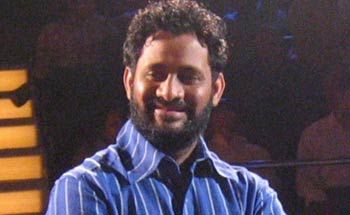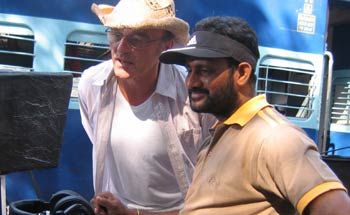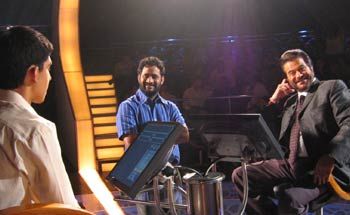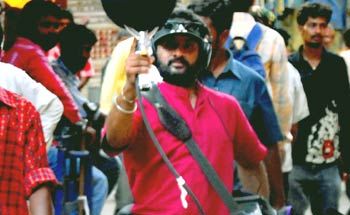



Indian film Sound Mixer and Sound Designer Resul Pookutty has won the British Academy Of Film & Television Arts, 2008 (BAFTA) award on Sunday evening and might well go on to win the Academy award for Sound Mixing of Danny Boyle's Slumdog Millionnaire later this month.
I am humbled and honoured and this is great news for all technicians back home,... Pookutty told Priyanka Jain after winning the award just hours earlier. Resul's film credits include, ...Slumdog Millionaire..., Ghajini..., Saawariya..., Gandhi My Father..., Zinda..., Black..., Musafir..., Amu..., Mathrubhoomi - A Nation Without Women..., Snip!... and Boom.... He was also the sound designer on all these films. Resul's other sound design credits include Raat Gayee Baat Gayee..., I'm 24..., ...Woodstock Villa..., Dus Kahaniyan..., Mithya..., Mixed Doubles..., Raghu Romeo..., Everybody says I'm Fine!..., Split Wide Open... and Private Detective....
He won The Zee Cine award for the best Sound Designer of the year for the film Musafir.... His work in the film Black... set a new benchmark in feature film sound. It won all the major awards in India for Sound Recording and Sound Design in 2006 and merited laudatory praise in the American Cinematographer.
Incidentally, Resul is one of the pioneers to work in sync sound, a practice that was not so common until sometime back in India.
Pookutty, also nominated for the Academy Award for Slumdog Millionnaire calls himself the underdog who comes from a small village Vilakkupara, Kollam district of Kerala. To me, �underdog' is not a derogatory term. I am an achiever. I represent most of my countrymen. My village didn't even have electricity. I studied under a kerosene lamp," says Pookutty, a '95 FTII graduate who plans to wear a mundu, dhoti- the traditional Kerala attire at the Oscars.
Resul, tell us how your journey began. When did you decide you wanted to make a career in sound?
I went through the normal confusion graduates do about what one has done and what one wants to do in the future. I studied physics while graduating and then went on to do Law at Trivandrum. While still in the first year of Law, I got through the Sound Engineering course at Film and Television Institute of India, Pune. Once I got into the college, I realised that it's not just sound recording and it has nothing to do with engineering as such. It was about learning and understanding film as a medium of art and the craft of filmmaking – be it sound, editing or camera or production designing. We lived and breathed films watching almost four to five films every day. Had I not got the state and central government scholarships at FTII, I wouldn't have made it so far. For me, it's been an incredible journey.
My first film was with Rajat Kapoor. Rajat was making his film in 94-95 when I had just finished film school. Earlier, my senior from FTII, Vikram Joglekar was supposed to do the sound of that film, but he moved to Italy. After 40 days of working together, Rajat developed a huge confidence in me and put the entire responsibility of the film's sound on me. Handling a film of that stature, which had a lot of experiment in terms of form and content, was a huge thing for a beginner like me. The association with Rajat started there. He knew more about sound than me and my job was to deliver what he wanted. In those times, he was a guiding force to me.
How did you bag The Slumdog Millionnaire?
A line producer friend called me when I was shooting Saawariya and asked me if I would like to work on a film with Danny Boyle. Twelve years back, when I was a student, Danny's Trainsporting poster adorned the walls of my FTII hostel room and here I was now, being asked to work with him. I took it up. Danny first wanted me to read the script. In India, people keep the script a big secret but Danny first wanted me to read it and then discuss my views on it.
Was Academy award winner-director Danny Boyle aware of the work you do?
He had got with him a sheet of papers and asked me which film he should watch. It was a list of films I had worked on – Black, Gandhi My Father. I was floored by the humility of that man. He did not need to do it. He treated me as an equal. He had that kind of interest in each person he worked with. That the line producers pitched for me, also worked in my favour.
Boyle was very surprised about the manner in which we work in the Indian film industry. There if someone is doing live sound, is recording sound of the location, sound editing, sound mixing in the studio - the technician is only doing that. Their specialisations are demarcated. Whereas here I record on location, edit the sound, sit through sound design, mix the film from the start to the end of the film. It was surprising for them to know that we work like that. And he wanted someone like that - one person in charge of everything. So I was elated.
Did you ever fathom the possibility of the film doing so well?
When we started working, I didn't know that the film would do so well. It's been an extremely difficult film. Danny was using multiple cameras. He was not shooting the traditional way films are shot, so it was difficult to record sound, especially in a place like Mumbai where everything is noisy, - traffic, people, and he wanted to shoot at Andheri and Vakola station, Juhu slums, Dharavi which could be a nightmare for the soundman. Imagine shooting inside the Taj Mahal, Agra, you can't stop the tourists; where thousands of people visiting every day.
For me, the film was a big unlearning. I could not have done the film in the traditional method of approaching. I decided that since the film is about the city, I would have to capture the soundscape of the city.
What were the challenges you faced while recording for Slumdog?
I thought doing the sound for the show that we shot in studio is going to be easy for me.
It's a television show, everything is controlled, two people sitting and talking. It's a film based on the show, the show is so huge and popular. They did not want to change anything about the format. That posed an incredible challenge as we cannot shoot a film the way you shoot television and he wanted to shoot everything live. That's how they shoot the show in television. It's in one take. Danny wanted to do it in a similar manner. There are nine video cameras running, at the same time there is live switching going on; there are other scenes in the movie between which the show is coming in –so its part of the whole film- so shooting live for the television, at the same time its being covered by film and digital cameras. So we had to record sound on television camera at one level and digital camera at another level.
It's a Dolby digital film, needs to be recorded in 5.1 surround. In that situation, I had to do a television mix, mix for an editor, so I ended up having 17-18 tracks of recording, which is unheard of. I had to create a pulley system where I was swinging microphones, opening up computer screens, putting microphones there. We recorded the shoot of the television show in surround, something no one has done in the world.
On the first day, I was crying. I used to feel very frustrated. There was a lot going on -fighting with people in Dharavi, humungous amount of crowd control, fights on locations with team. It was a total chaos.
Did Danny make changes based on technicians' suggestions?
Danny has incredible respect for the team, he says Indians work ten times which needs to be respected to the minutest level. He comes from a theatre background, how actors perform in a given environment; he is a fantastic technician and understands the possibilities and limitations of the medium. He is a perfect blend of it. He has no problems changing his edit or shooting. That has been a great learning at a human level and an unlearning on a very technical level.
If Richard Attenborough did not come to India to shoot Gandhi, Bhanu Athaiya (Oscar for costume design in "Gandhi") would not have got an Oscar and now that Danny's made such a fantastic movie, Indians too have an opportunity, he smiled. This has raised the bar for millions of people in our country.
You have worked with Anil Kapoor on Musafir and with his daughter Sonam on Saawariya. Did the rapport help with the new film?
One day, when I was working on Saawariya, Anil Kapoor came to the sets to see me. His daughter Sonam and I are close friends as she had assisted on Black, a film I worked on earlier. I had also worked with Anil on Musafir for which I won the Zee cine Awards and his home production Gandhi- My Father; sonam recommended me for Gandhi. So my rapport with Anil goes a long way back.
He asked me if I knew who Danny Boyle was and whether he should accept a role in Slumdog Millionnare. "Meine suna hai you are doing Danny's film. Mein bhi kar lun kya," he asked me. That's the simplicity of one of the finest actors in our country. He is like a brother and friend to me.
You have worked with Rahman on Ghajini as well.
Because of my association with Rahman on Slumdog Millionnaire, we got along well and Rahman also put in a word to Murugadoss for Ghajini.
It's a great high when a composer works with your sounds. What you do as a sound man and what the music composer does should not clash. So I always wanted this exchange to happen with the composers. For Ghajini when Rahman came here, he heard the tracks I gave him, of each reel of sound design that I gave him, we would talk. Slumdog created that context with him, we have admiration for each other's work. Many nights were spent together working on Ghajini.
Most of the score was recorded by Rahman in London. But he used my tracks.
You are the youngest and first Indian Cinema Audio Society (CAS) nominee. How important is the CAS nomination for you. What does it mean?
The Cinema Audio Society or CAS (USA) is a conglomerate of 550 of the best audio professionals and associates from around the world, which awards sound technicians for their outstanding contribution in the field of Sound Mixing in Motion Pictures and Television Industry.
The nomination itself is a privilege and the award, an honour given to the Sound Mixers for their career achievement in Motion Pictures. CAS is the big pappa of all awards for a technician. The winner can add CAS... after their names in the film screen credit. The previous achievers include multiple Oscar winners like Ray Dolby, Robert Altman, Jack Solomon, and Walter Murch etc.
What's the reaction in Bollywood been like to your Oscar nomination?
Rani Mukerjee was the first to call and joke into the phone. "I can't touch the Oscar now that you have got a nomination. I am so happy for you Resul." It's really touching when these people remember you at the peak of your glory.
Tell us in brief about the Sound Engineer's role in a film.
A sound man does what a camera man does for a film. A cameraman is responsible for the visual aspect of the film, is responsible for how the film is looking and visually comes across to an audience.
Likewise, a sound man is responsible for how a film is sounding; what kind of texture it has, whether it is deep, dark. We need to make the visual look corresponds to sound texture and are responsible for the auditory texture of the film. Two major works are involved in this-one is the sound we record during the shooting of the film and –most of the time in India cinema that sound is not used. It is used as a reference for dubbing, which is done after the film is shot at a later stage. We specialize in sync sound recording, which records the final sound track while we are shooting the film itself, a practice that I have been following for last 12 years.
While doing sync sound we are concentrating on the spoken dialogue of the artist on location. We are recording the performance of the artist on location, ambience, and specific sounds.
For example if we are shooting at VT station, then all the sounds of the train coming, announcement, chatter of the passengers etc. various kinds of sound effects are all recorded during the shooting itself. This is eventually used in the film for the design element.
On the post production stage just as the picture editor edits the picture, we edit all the sounds, there are four major elements in this –one is the dialogue that is record as part of the performance of the artist. Ambience, the second element, that determines where it is placed, where the action is taking place, is it at night, is it near the sea, inside a train, plane or car, all these are recorded. The third element is the sound effects, suppose it is the chase sequences, of the cars moving in, specific sound that determines the scene, what the scene is about, we cut and edit all those sounds and put it all together, and then there is background music of the film. Which is emotional content of the film, which is scored in congestion with the sound designer, music director and director, the end of the second stage is mixing all these four elements together, - ambience, performance, ambience of the place, background music,
In the next stage, we treat the sound, we add echo, echo vibrations, equalization, all these star effects, and we create an output, which is the audio element of the film that we experience in theatre. This encompasses the job of a sound person in the film.
You are now a BAFTA winner and an Oscar nominee. Will this help in bringing your profession in the limelight?
I would want to believe that. Not just sound people but the entire gamut of technicians has come into light, about the people behind the
All this while technicians have never been the face of the film in India, its always the actors, directors, music directors or writers, I hope with this nomination, people will start taking technicians more seriously in mainstream cinema and become aware and appreciate the technicians work of adding value to the whole product.
We are not behind in terms of technology available to us as or the technology being used the way it is used in the west. The difference is always been the attitude towards those elements. With this nomination there will be a new awareness, the attitude will change for the betterment of cinema.
Who has been your inspiration domestically and internationally?
My seniors at FTII - Satish PM and Vikram Joglekar have been like mentors to me. I loved the sound in Ritwik Ghatak, Adoor Gopalakrishnan and Mani Kaul's films. Internationally I dig Andrei Arsenyevich Tarkovsky, Kislovsky among others.
What projects are you working on now?
There is Rajat Kapoor's Rectangular Love Story, Saurabh Shukla's Pappu Can't Dance Saala, Sharad Kataria's Mocktail, Ashtvinayak's Blue and Tips's Prince.
Now that you have won the BAFTA award and might as well go bag an Academy award, will you increase the price for your work?
[Laughs] You are chasing away the producers by asking me that question. I would want to command a better price, a price that I deserve. Let's see.
How well are sound engineers paid in our country?
We are not paid badly. But not as much as a cameraman gets paid.
Which Indian filmmakers have you enjoyed working with?
I have enjoyed working with filmmakers like Rajat Kapoor, Sanjay Gupta, Sanjay Leela Bhansali, A Murugadoss.
What would your advice be to fellow sound engineers back home?
Work hard.